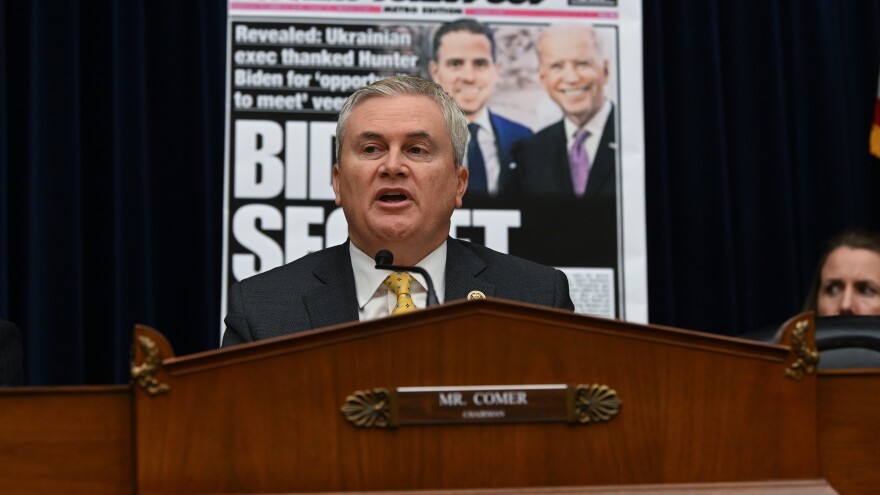House Republicans are kicking off an impeachment inquiry into allegations of corruption against President Biden that are so far not corroborated. House Majority Leader Kevin McCarthy says this process is an investigation into whether there was in fact any wrongdoing on Biden's part. McCarthy's approach makes this impeachment inquiry distinct from probes into previous presidents, where there had been some credible evidence of wrongdoing from the outset.
The first hearing in the inquiry is scheduled for Thursday, held by the House Oversight Committee. The hearing sets out to explain "the basis for an impeachment inquiry" into the president.
The White House has dismissed the House Republicans' inquiry as a baseless political stunt.
Impeachment is a political process; it's a tool that Congress has to remove a president from office if they have committed "Treason, Bribery, or other high Crimes and Misdemeanors," according to the Constitution. It is not a legal trial, though the evidence gathered could inform a separate judicial process.
The current inquiry into Biden stands apart from past impeachment probes in that the allegations are not tied to a particular day or action — and the claims date back to Biden's time as vice president. Impeachment probes into former Presidents Richard Nixon, Bill Clinton and Donald Trump related to allegations that took place while they were in office. Read more about how those impeachment efforts compare here.
Here's an outline of what House Republicans are investigating:
Foreign business dealings
House Republicans allege that Biden benefited from the foreign business dealings of his son, Hunter, when Biden was vice president.
"The hearing will focus on constitutional and legal questions surrounding the president's involvement in corruption and abuse of public office," said a House Oversight Committee spokesman.
The committee has published a timeline of what it deems "influence peddling" along with other documents it considers evidence.
While the formal impeachment inquiry is just beginning, House Republicans have been investigating the Bidens for months. They made it a focus of the oversight and judiciary committees after Republicans won control of the chamber last November.
But former federal prosecutor and legal commentator Renato Mariotti told NPR that the allegations lack details that specifically demonstrate corruption on Biden's part.
"Generally speaking, when we're talking about corruption, you're talking about the use of trading an official act for something ... of value — so for example, you know, using his office to try to obtain money or property for himself or his son," Mariotti said. "What I think is missing here are any specifics about how that has allegedly been done, one way or the other."
For example, Devon Archer, a business associate of Hunter Biden, has claimed that then-Vice President Biden sent greetings when Hunter hosted conference calls with clients and stopped by briefly at business dinners. But Archer conceded in his testimony to the committee that he did not have evidence that President Biden received any direct financial benefit as a result of the interactions.
The taxes investigation
Republicans have also made broad allegations about Hunter Biden receiving preferential treatment from the IRS and the Justice Department. Two IRS employees have testified that an investigation into his tax issues was intentionally weakened. Other witnesses have disputed their version of events.
Hunter Biden pleaded not guilty to two misdemeanor charges related to his taxes in July, after a deal with federal prosecutors that would have avoided a trial fell through. Earlier this month he sued the IRS for failing to protect his personal information, apparently in connection to the IRS agents whom Republicans have referred to as whistleblowers.
Meanwhile, a Justice Department special counsel has indicted Hunter Biden on three felony charges for allegedly purchasing a gun while he was addicted to drugs in 2018. The initial deal around his tax charges would have also allowed him to avoid prosecution on a firearm offense.
The special counsel acts independent of the Justice Department, and Attorney General Merrick Garland has maintained that the investigation is proceeding without outside influence.
NPR senior White House correspondent Tamara Keith and congressional correspondent Deirdre Walsh contributed to this report.
Copyright 2023 NPR. To see more, visit https://www.npr.org.


